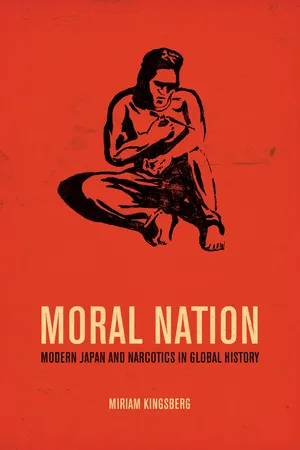
- 328 pages
- English
- PDF
- Available on iOS & Android
eBook - PDF
About this book
This trailblazing study examines the history of narcotics in Japan to explain the development of global criteria for political legitimacy in nations and empires in the nineteenth and twentieth centuries.
Japan underwent three distinct crises of sovereignty in its modern history: in the 1890s, during the interwar period, and in the 1950s. Each crisis provoked successively escalating crusades against opium and other drugs, in which moral entrepreneurs--bureaucrats, cultural producers, merchants, law enforcement, scientists, and doctors, among others--focused on drug use as a means of distinguishing between populations fit and unfit for self-rule. Moral Nation traces the instrumental role of ideologies about narcotics in the country's efforts to reestablish its legitimacy as a nation and empire.
As Kingsberg demonstrates, Japan's growing status as an Asian power and a "moral nation" expanded the notion of "civilization" from an exclusively Western value to a universal one. Scholars and students of Japanese history, Asian studies, world history, and global studies will gain an in-depth understanding of how Japan's experience with narcotics influenced global standards for sovereignty and shifted the aim of nation building, making it no longer a strictly political activity but also a moral obligation to society.
Japan underwent three distinct crises of sovereignty in its modern history: in the 1890s, during the interwar period, and in the 1950s. Each crisis provoked successively escalating crusades against opium and other drugs, in which moral entrepreneurs--bureaucrats, cultural producers, merchants, law enforcement, scientists, and doctors, among others--focused on drug use as a means of distinguishing between populations fit and unfit for self-rule. Moral Nation traces the instrumental role of ideologies about narcotics in the country's efforts to reestablish its legitimacy as a nation and empire.
As Kingsberg demonstrates, Japan's growing status as an Asian power and a "moral nation" expanded the notion of "civilization" from an exclusively Western value to a universal one. Scholars and students of Japanese history, Asian studies, world history, and global studies will gain an in-depth understanding of how Japan's experience with narcotics influenced global standards for sovereignty and shifted the aim of nation building, making it no longer a strictly political activity but also a moral obligation to society.
Frequently asked questions
Yes, you can cancel anytime from the Subscription tab in your account settings on the Perlego website. Your subscription will stay active until the end of your current billing period. Learn how to cancel your subscription.
No, books cannot be downloaded as external files, such as PDFs, for use outside of Perlego. However, you can download books within the Perlego app for offline reading on mobile or tablet. Learn more here.
Perlego offers two plans: Essential and Complete
- Essential is ideal for learners and professionals who enjoy exploring a wide range of subjects. Access the Essential Library with 800,000+ trusted titles and best-sellers across business, personal growth, and the humanities. Includes unlimited reading time and Standard Read Aloud voice.
- Complete: Perfect for advanced learners and researchers needing full, unrestricted access. Unlock 1.4M+ books across hundreds of subjects, including academic and specialized titles. The Complete Plan also includes advanced features like Premium Read Aloud and Research Assistant.
We are an online textbook subscription service, where you can get access to an entire online library for less than the price of a single book per month. With over 1 million books across 1000+ topics, we’ve got you covered! Learn more here.
Look out for the read-aloud symbol on your next book to see if you can listen to it. The read-aloud tool reads text aloud for you, highlighting the text as it is being read. You can pause it, speed it up and slow it down. Learn more here.
Yes! You can use the Perlego app on both iOS or Android devices to read anytime, anywhere — even offline. Perfect for commutes or when you’re on the go.
Please note we cannot support devices running on iOS 13 and Android 7 or earlier. Learn more about using the app.
Please note we cannot support devices running on iOS 13 and Android 7 or earlier. Learn more about using the app.
Yes, you can access Moral Nation by Miriam Kingsberg in PDF and/or ePUB format, as well as other popular books in History & Japanese History. We have over one million books available in our catalogue for you to explore.
Information

16
·
moral
crusade
in
meiji
japan
table
1
Foreigner
violations
of
anti-opium
legislation
in
Japan,
1890
–
1911
Year
Violations
1890
2
1891
1
1892
2
1893
1
1894
11
1895
21
1896
20
1897
12
1898
20
1899
7
1900
13
1901
29
1902
18
1903
13
1904
12
1905
18
1906
18
1907
21
1908
30
1909
31
1910
40
1911
38
source:
Nihon
teikoku
to
-
kei
nenkan,
vols.
11–32
(1892–1913).
“ENTERING
THE
WEST”
In
addition
to
deploying
opium
to
“leave
Asia,”
moral
entrepreneurs
of
the
Sino-
Japanese
War
era
also
sought
to
“enter
the
West,”
or
to
make
Japan
part
of
the
international
community
of
sovereign
states
by
demonstrating
“civilization
and
enlightenment
[bunmei
kaika].
”
The
rejection
of
narcotics
not
only
justified
Table of contents
- Cover
- Title
- Copyright
- Contents
- List of Illustrations
- List of Tables
- Acknowledgments
- Introduction: The Moral Nation
- 1. Moral Crusade in Meiji Japan
- 2. Drug Users in the Epicenter of Consumption
- 3. Cultural Producers and the Japanese Empire
- 4. Cultural Producers and Manchukuo
- 5. Merchants
- 6. Law Enforcement
- 7. Laboratory Scientists
- 8. Medical Doctors
- 9. Moral Panic in Postwar Japan
- Notes
- Works Cited
- Index